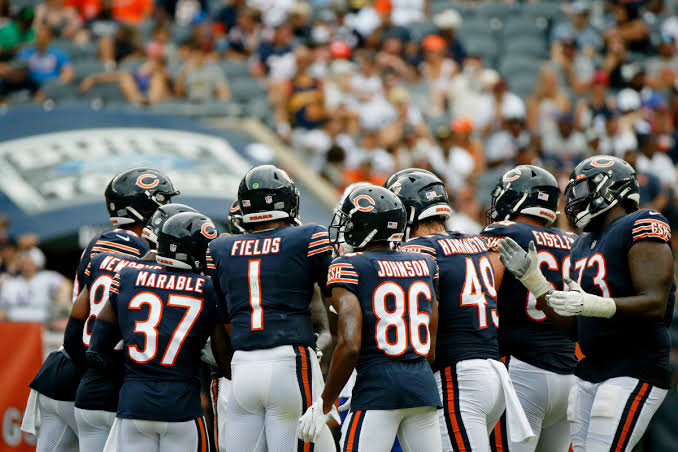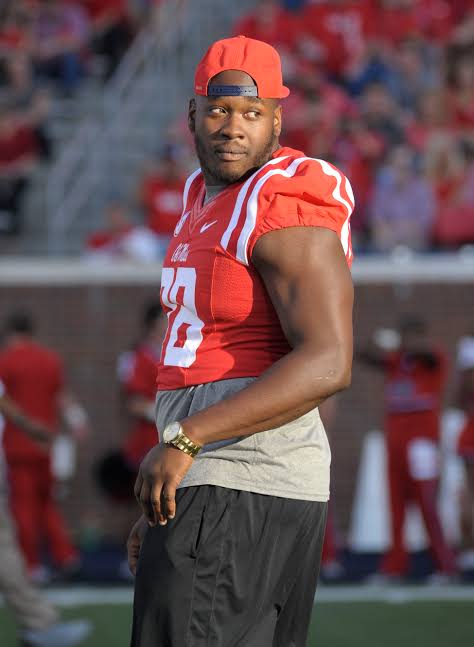
The Chicago Bears are no strangers to adversity in recent years, but the latest blow to their offensive line has raised serious concerns for the team’s future. In a move that’s sure to affect the team’s overall performance, the Bears have placed starting offensive lineman Ryan Bates on injured reserve and signed running back Darrynton Evans to the active roster. While these moves are designed to address immediate roster needs, they raise a number of questions about the team’s priorities and the long-term impact on their season.
Ryan Bates, who has been a key player for the Bears’ offensive line, suffered an injury that forced the team to make this decision. His absence from the lineup is a significant blow, considering the offensive line has already struggled to provide quarterback Justin Fields with consistent protection this season. With Bates now out of action, the Bears are left scrambling to find a replacement and shore up their line before their playoff hopes slip away. But while this move might seem logical on the surface, there’s a lot more at stake here than meets the eye.
A Defensive Strategy That Could Backfire
On one hand, the decision to place Bates on injured reserve was somewhat inevitable given the severity of his injury. However, the decision to immediately sign Evans to the active roster instead of bringing in more offensive line depth has left many scratching their heads. The Bears’ running back depth has been solid in recent years, and while Evans could provide some additional support in the backfield, it is hard to ignore the fact that their offensive line is in dire need of reinforcements.
Fields, who has been under increasing pressure from defenses all season, will now have even less protection, making him an even bigger target for opposing pass rushers. With Bates on the sidelines, the Bears’ offensive line will need to rely heavily on untested players, and the potential for further injuries or breakdowns only increases. While Evans may add some explosiveness to the running game, his signing does little to address the fundamental issue that has plagued the Bears’ offense: the lack of adequate protection for their quarterback.
The decision to sign Evans over addressing the offensive line situation directly could end up costing the Bears dearly. At a time when the team is trying to build momentum and push for a playoff berth, this risky move has the potential to derail their offensive game plan entirely.
What Does This Mean for the Bears’ Offensive Line?
The offensive line has been one of the biggest weaknesses for the Chicago Bears over the last few seasons, and placing Ryan Bates on injured reserve only highlights this issue. Bates, who had been playing a crucial role in stabilizing the offensive line, was a key player in helping the Bears improve their offensive line play. With him sidelined, the team’s options become limited, and they may find themselves scrambling to adjust midseason.
Adding depth to the offensive line should have been the Bears’ priority after Bates’ injury, yet they opted to bolster the running back position instead. While there’s no doubt that Evans could be a valuable asset in terms of contributing to the running game, the decision not to add immediate help to the offensive line may have long-term consequences.
Without Bates, the Bears will need to rely on players who have not yet proven themselves to be reliable in the trenches. Quarterback Justin Fields, who has faced numerous sack and pressure issues throughout his career, will now find himself in an even more vulnerable position. The offensive line struggles that have plagued the Bears in the past may now worsen, potentially ruining their chances of making any serious playoff push.
Is This the Right Time for a Running Back Addition?
The timing of the Bears’ decision to bring in Evans is also a topic of discussion. While the running back room may have room for depth, it’s debatable whether Evans is the best use of the Bears’ resources at this moment. The team’s offense has been inconsistent, with Fields often struggling due to poor pass protection. The addition of a running back, while a good move for rotational depth, doesn’t address the primary issue the Bears face—stabilizing their offensive line to protect their young quarterback.
Evans, who has had a relatively quiet career in the NFL, does not immediately inspire confidence that he will change the Bears’ fortunes. While he can offer some speed and elusiveness as a backup, it’s unclear whether he can contribute enough to tilt the balance in the Bears’ favor. Meanwhile, the offensive line remains a critical weakness, one that could severely impact the overall health of the offense.
What makes this move even more puzzling is that the Bears have already had issues with injuries and depth along the offensive line this season. Instead of making a more proactive move to add experienced offensive linemen or consider a trade, the Bears decided to bring in a running back who may not be able to contribute in the way that is most needed at this moment in time. The Bears’ decision-making raises concerns about the team’s ability to properly evaluate and address their most pressing needs.
Will the Bears Regret This Move?
The Chicago Bears have struggled for years to build a competitive and reliable offensive line, and with Bates now on injured reserve, that struggle is only going to get worse. While it is still early in the season, this decision to sign a running back instead of focusing on bolstering the offensive line could come back to haunt them. A young quarterback like Justin Fields requires consistent protection in order to develop, and with Bates gone, the chances of further breakdowns in the offensive line grow exponentially.
If Fields continues to be under pressure or, worse, injured as a result of poor offensive line play, the Bears’ season could quickly spiral out of control. While Evans might have some potential to contribute in the running game, it’s hard to ignore the fact that without solid protection up front, the Bears will continue to struggle on offense.
In the coming weeks, the Bears will have to prove that they can overcome their shortcomings in the trenches. If they don’t, the impact of this seemingly minor decision could end up being far greater than anyone anticipated. As the season unfolds, all eyes will be on the Bears’ ability to address their biggest weakness—and whether the decision to focus on the running back position was truly the right move.







